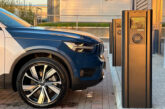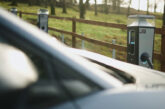
A YouGov survey1 reveals a significant shift towards out-of-home EV (electric vehicle) charging, as public and destination charging facilities start to step up to meet growing demand.
The survey, conducted by YouGov on behalf of CTEK, the leading global brand in vehicle charging, reveals that only 56% of EV owners are now charging at home (down from 78% in 2021), with 20% charging at shopping centres, 20% at work, 11% at hotels and 8% at restaurants. 17% are charging at petrol stations, but only 7% give this as their preferred place to charge, and 12% actually say that not having to visit petrol stations is their favourite thing about EV ownership!
Figures from Zap Map show that the number of public charge points has risen by 34% since last year2 and, encouragingly, the YouGov survey reveals that availability of public charging is now far less of a concern for EV owners, with only 8% giving lack of local charging facilities as their biggest frustration, compared with 30% in 2021.
However, almost three quarters (71%) of UK motorists still feel that more charging infrastructure is needed to meet growing demand for EV charging and, although this has reduced slightly from 78% in 2021, remains the highest level in Europe.
The importance of out-of-home charging is further evidenced by 44% of UK motorists saying that availability of public charging makes them more likely to buy an EV. In addition, half (50%) of drivers say they’re more likely to buy an EV if they have charging facilities at work, and this rises to 81% amongst former EV owners.
Reliability of out-of-home charging remains an issue with 9% of UK EV owners, 7% are frustrated by complexity of payment and 59% feel that lack of EV roaming, which would allow drivers to access different providers’ chargers and networks, is a major frustration. This is an even greater issue in Germany and France, where 67% and 62% of drivers respectively are frustrated by lack of EV roaming. It is less of an issue in The Netherlands and Scandinavia, where EV roaming is better established.
Cecilia Routledge, Global Director, Energy & Facilities for CTEK, said: “It is extremely encouraging to see that the availability of public and destination charging facilities is starting to step up to meet the growing demand for out-of-home charging, as this is a vital factor in the overall acceptance and take up of electric motoring.
“However, reliability of out-of-home charging remains an issue, and this is an aspect that needs additional focus, along with steps to reduce the complexity of payment and industry-wide commitment to rolling out EV roaming, which would give EV drivers better access to charging stations, in the same way that mobile phone users can simply access different networks as they travel around the globe.”
With the escalating cost of living and rising fuel prices, it’s hardly surprising that financial considerations are becoming increasingly important for all motorists. A quarter (25%) of current EV owners now give lower running costs as their favourite thing about EV ownership, ahead of 21% citing environmental benefits. However, UK EV owners remain the most environmentally conscious in Europe, with 33% giving concern for the environment as the main reason for purchasing an EV, compared with an average of 23% in the rest of Europe, where lower running costs are the main reason for purchase.
For non-EV owners, lower running costs have become more important than access to charge points, and the purchase price of EVs remains the biggest barrier for motorists considering the switch. In addition, 64% of drivers feel that Government subsidies are essential to encourage more people to buy EVs, this being the highest level in Europe.
The survey also highlighted a need for clear, consistent information about EVs and EV charging, to help drivers cut through the mountains of, sometimes conflicting, information that’s out there. 30% of drivers said they were confused by all the information available on EVs, 45% said they wouldn’t know where to go to find out about EVs, and 17% of drivers said that knowing more about EVs and how they work would encourage them to purchase one.
Here are some other interesting facts and figures from the survey (all figures relate to the UK, unless stated).
- UK and Dutch adults are the most positive in Europe about EVs, with 55% of motorists in these countries believing electric motoring is the future of road travel. This rises to 70% of current UK EV owners.
- 81% of current EV owners and 77% of hybrid owners say they are likely to buy a fully electric vehicle in the future.
- The number of EV owners giving driving range (the distance that a vehicle can travel on one charge) as their main frustration has reduced from 23% in 2021 to 17% this year, but more than half (51%) of EV owners still have some level of range anxiety.
- EV owners give lower running costs as their favourite thing about electric motoring (25%), with 21% mentioning environmental benefits, 12% saying they like not having to visit petrol stations, 11% liking the vehicle’s technology, and 8% liking ‘fringe benefits’ such as free parking and reduced congestion charges.
- 40% of EV owners charge once a week or less, 26% charge 2 to 3 times a week and 17% charge 1 to 3 times a week. Only 14% charge every day.
- 29% of EV owners drive their vehicles 4 to 6 times a week, 24% drive 2 to 3 times a week, 20% every day, 13% once a week and 11% once a fortnight or less.
- The availability of Government subsidies, to make an EV more affordable, remains the main thing that would encourage non-EV drivers to make the switch (49%). Lower running costs have become more important (44%), and access to charge points (40%) less important than last year. Environmental concern remains the fourth biggest incentive to switch, at 30%, followed by knowing more about EVs and how they work (17%).
- In terms of purchase costs, 18% of UK drivers said they would pay up to £10K for an EV, 12% up to £15K, 9% up to £20K, 7% up to £25K, 4% up to £30K and 1% over £30K.
A full report, with findings on electric vehicle take up and ownership across Europe (UK, Sweden, Germany, the Netherlands and Norway), is available here










